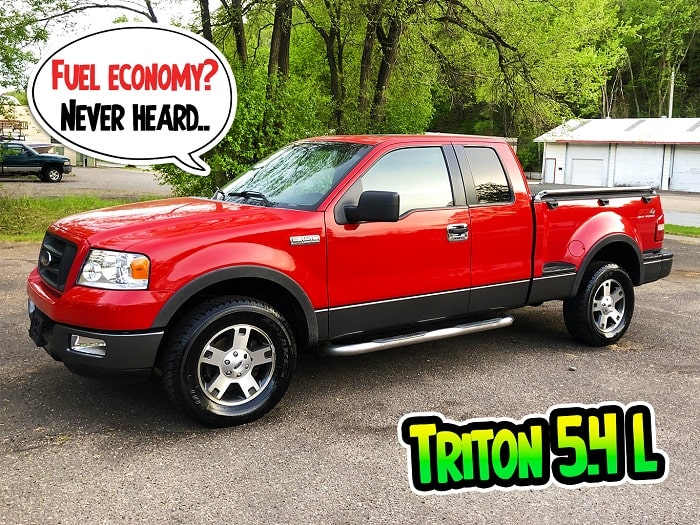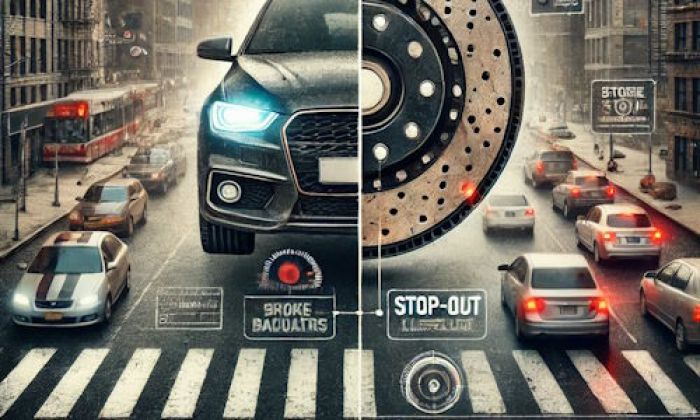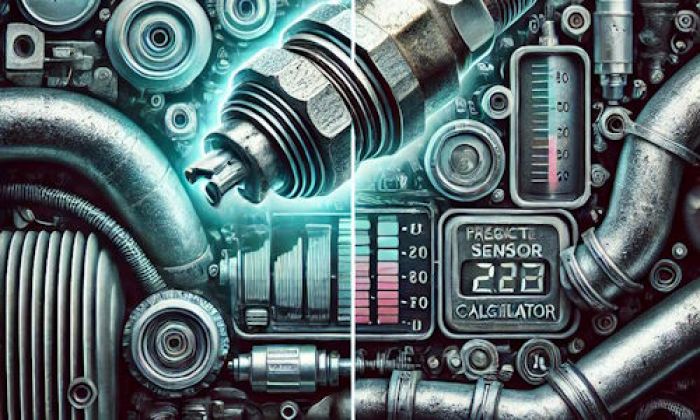
The 5.4L Ford Triton engine is a solid engine that has been in production for more than a decade and a half. However, no engine is perfect, and the 5.4 Triton engine has a couple of specific problems. Be sure to read this article in order to know what to look out for if you’re interested in buying a 5.4 Triton Ford.
- Ignition system problems
- Fuel pump driver module issues
- Various engine timing problems
- Oil leaks
- Spark plugs
- Problems with the cam phaser
- Engine vibrations and shaking
- Engine misfiring
- Catalytic converter issues
Ignition System Problems
The main problem with the ignition system is down to faulty ignition coils which are designed using the COP method when the rubberized material which covers the coils starts to deteriorate. This results in loss of power and misfiring and can be fixed fairly easily by just replacing the worn-out coils. These can also cause issues if they are penetrated by water.
Fuel Pump Driver Module Issues
This issue is commonly associated with Ford F-150 models equipped with a 5.4L Triton engine. The fuel pump driver module tends to cut off fuel completely which in turn shuts the engine off. This can be extremely dangerous and is more common with trucks driving on the highway. If you come across the Error Code P1233, it’s the fuel pump driver module.
Engine Timing Problems
The timing issues that plague the 5.4L mostly consist out of timing chain issues, tensioner issues, or Variable Valve timing issues. Whenever you sense your engine sounding strange, it is probably due to timing issues which are known to start a domino effect and damage all the rest of the engine. You should not drive your car while experiencing timing issues, so be sure to take your car in for an inspection. Issues such as these are the most serious ones of them all because if they are not remedied in due time they can cause havoc under the hood.
Oil Leaks
The most common leakage issue with the 5.4L Triton engine is the one associated with the Oil Pan Gasket. It may be a bit of a stretch to call this an engine issue, but it still needs to be mentioned because the oil gasket tends to be a reoccurring problem, especially for older Triton engines. If you sense any burning oil odors, chances are that your oil pan gasket is leaking.
Spark Plug Issues
The most common spark plug issues with the 5.4 Triton engines are blown out spark plugs. These issues were commonly associated with older Triton engines, and it is believed that 2004 engines and newer ones don’t have as many blown out spark plug issues as older models do. Ford recognized this issue and suggested that LOCK-N-STITCH thread inserts are the easiest and best fix.
Problems With The Cam Phaser
Issues with the cam phaser are also causing quite a bit of damage to the reputation of the 5.4 Triton engine. If you hear any rattling sounds, sounds like something is loose and running wild inside the engine shaft, chances are that the cam phaser is the one to blame. The easiest and most logical way of fixing these issues is to get a completely new cam phaser which can cost quite a lot of money.
Engine Vibrations And Shaking
Not every Triton engine had problems with engine vibrations and shaking, but some of them did. The 2005 Ford Expedition which was mostly equipped with the 5.4 Triton engine was known to have these issues. It is still unclear as to what caused these issues, but spark plug or loose hose issues are probably to blame.
Engine Misfiring
People often ignore the fact that their engine is misfiring, but if you continue daily driving your 5.4L Triton engine, you will eventually cause more serious issues. The most reoccurring problem of driving a misfiring Triton is a troubled catalytic converter. Because of this, you should not drive your car before fixing engine misfiring, otherwise, your cats will cause more serious problems.
Catalytic Converter Issues
If this issue goes unsolved for an extended time, chances are that the engine will eventually start backfiring through the intake which will result in the truck not being able to accelerate past 30mph or so. At this stage, your catalytic converter might be severely damaged which is a considerable issue because a new catalytic converter can cost upwards of $2000.
Worst And Best Years Of The 5.4L Triton Engine
The Triton 5.4L V8 is an iconic Ford engine, but for some model years, this engine had nowhere near the iconic status it carries today. As such, you need to be especially careful while looking at 2004-2013 5.4 Triton trucks because these model year trucks are known to be the most problematic.
2004 was one of, if not the worst year for the 5.4L because the issues listed for this model year made the 2004 5.4L F150 one of the worst trucks on the market. On the other hand, 1993-1996 5.4 Triton trucks and 2013-2014 models are commonly referred to as the best years for the 5.4L Triton V8.
Here are the specs of the 5.4L Ford Triton engine
FORD 5.4L MODULAR V-8 SPECS
|
Engine: |
5.4L 16v SOHC, 24v SOHC, 32v DOHC |
|
|
Type: |
90° V-8 |
|
|
Engine Family: |
Ford Modular, "Triton V-8" |
|
|
Production Plant(s): |
2v produced at Windsor Engine Plant in Windsor, Ontario |
|
|
Applications: |
1997 - 2010 model year Ford F-150/F-250/F-350 pickups |
|
|
Displacement: |
330 cid, 5.4 liters |
|
|
Firing Order: |
1-3-7-2-6-5-4-8 |
|
|
Engine Block Material: |
Aluminum, cast iron depending on model year |
|
|
Cylinder Head Material: |
Aluminum |
|
|
Deck Height: |
10.079" |
|
|
Cylinder Bore: |
3.55" |
|
|
Cylinder Stroke: |
4.17" |
|
|
Compression Ratio: |
9.0 : 1 (2 valve/cyl engine) |
|
|
Aspiration: |
Naturally aspirated in standard F-150 models; supercharged engines available in Harley Davidson and Lightning models |
|
|
Valvetrain: |
Chain driven single overhead camshaft (SOHC), available in 16 valves (2 valves per cylinder) or 24 valves (3 valves per cylinder). Ford also built a high performance 32 valve 5.4L, but it was never offered in the Ford F-150. |
|
|
Ignition: |
Individual coil-on-plug ignition system |
|
|
Fuel System: |
Sequential multi-port fuel injection |
|
|
Engine Oil Capacity: |
1997 - 2003 |
6.0 U.S. quarts w/ filter |
|
2004+ |
7.0 U.S. quarts w/ filter |
|
|
Peak Horsepower: |
235 hp @ 4,250 rpm (1997 2v ratings) 550hp @ 5,000 rpm |
|
|
Peak Torque: |
330 lb-ft @ 3,000 rpm (1997 2v ratings) 510 lb-ft @ 3500 rpm |
|
FAQ Section
How Reliable Is The 5.4L Ford Triton Engine?
This engine has been in production for more than a decade, and it is safe to say that Ford figured a way of keeping this engine fairly reliable. That being said, you ought to properly maintain the engine if you want to reap the reliability rewards, if not, these engines are known to go bad fairly early. If you do everything right, this engine should serve you well for decades to come.
How Long Does A 5.4L Ford Triton Engine Last?
With proper maintenance, the 5.4L Ford Triton engine should last you at least 200k miles. However, there are cases out there where this engine has managed to cross the 300k or even the 400k mile mark. This only shows how well-developed this engine truly is. However, the way you use your truck also raises or lowers this mark.
Which 5.4L Ford Triton Model Is The Worst?
The 2004 Ford F150 equipped with the 5.4L Triton engine had the worst variation of this engine. The 2004 5.4L F150 was so unreliable that it made it one of, if not the worst truck of that year. Thankfully, these issues were later resolved which pushed the F150 towards becoming the best-sold truck in the US.
Is The 5.4L Ford Triton Engine Powerful Enough?
This engine usually produces between 235-550hp depending on the model and year of production. Torque is between 330-510 lb-ft. It is safe to say that these engines are great when it comes to horsepower, but the torque figures are somewhat lacking for the largest Triton equipped trucks.
Which Ford Models Use The 5.4L Triton Engine?
Pretty much the entirety of the Ford F series trucks uses the 5.4L Triton engine. Besides these, the Ford Expedition SUV also uses the 5.4L Triton engine and the E-series vans also use the 5.4L Triton engine. The upmarket Lincoln Navigator is also available with a 5.4L Triton engine.
About the authors
The CarAraC research team is composed of seasoned auto mechanics and automotive industry professionals, including individuals with advanced degrees and certifications in their field. Our team members boast prestigious credentials, reflecting their extensive knowledge and skills. These qualifications include: IMI: Institute of the Motor Industry, ASE-Certified Master Automobile Technicians; Coventry University, Graduate of MA in Automotive Journalism; Politecnico di Torino, Italy, MS Automotive Engineering; Ss. Cyril and Methodius University in Skopje, Mechanical University in Skopje; TOC Automotive College; DHA Suffa University, Department of Mechanical Engineering





Add comment